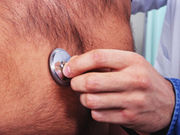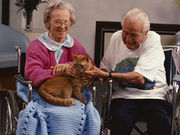NT-proBNP Improves Heart Failure Prediction in T2DM
Meaningful improvement in five-year risk-predictive performance with addition of NT-proBNP
Hospitalists Have Role to Play in Mitigating Opioid Use Disorder
Hospitalists must use opioids judiciously, including adhering to specific dose limits, setting expectations
AAIC: Mediterranean Diet May Help Preserve Cognitive Function
New studies suggest that adherence to better diet can improve brain function
AAIC: Alzheimer Biomarkers Up With Sleep Disordered Breathing
Studies found SDB/OSA tied to higher levels of biomarkers for Alzheimer's disease
High Court Rules Against Interstate Medical Liability
Case involves doctor providing care to football player in Idaho, who then died after injury in Washington
AAIC: Rx + Training Shows Benefit in Advanced Alzheimer’s
Skills lost, such as dressing or bathing, can potentially be relearned, small study suggests
Organizational Changes Encouraged for Safer Prescribing
Doctors describe swimming against tide of patient expectations, Rx culture, organizational constraints
Female Physicians Found More Likely to Leave Rural Practice
Higher county-level mobility for counties with smaller population size, lower PCP supply
Opioids Often Overprescribed in Patients Undergoing Surgery
Significant variation in opioid prescribing practices for each of 25 common elective procedures
AAIC: One Social Hour a Week in Dementia Care Improves Lives
Good staff training improves patients' quality of life, lowers costs, researchers say



















